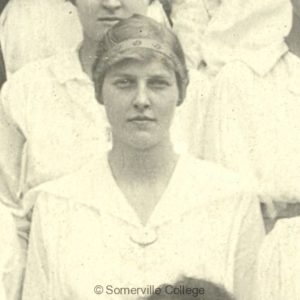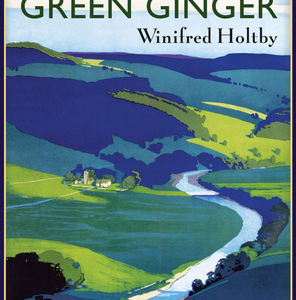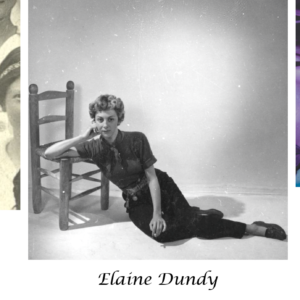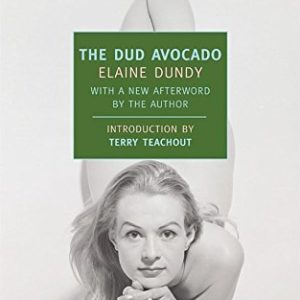Three voices
 Just by looking at them, you can tell they had something to say and it has been a delight to be on the receiving end of their words this winter. Even though a 100 years or so separates the lives of these authors all three created inspiring female characters that exposed the state of the state of things for women in their specific place in time. There is no more enjoyable history lesson. This post is about the unique voices of Winifred Holtby, Elaine Dundy, and Monica Drake.
Just by looking at them, you can tell they had something to say and it has been a delight to be on the receiving end of their words this winter. Even though a 100 years or so separates the lives of these authors all three created inspiring female characters that exposed the state of the state of things for women in their specific place in time. There is no more enjoyable history lesson. This post is about the unique voices of Winifred Holtby, Elaine Dundy, and Monica Drake.

1927
The Land of Green Ginger was written by Winfred Holtby. I had not heard of Holtby but such are the rewards of browsing Powells. I can’t say what drew me to that particular bookcase or the specific book cradled high on the shelf, maybe it was the soft green coloring on the spine; I’m a sucker for a good cover.
The Land of Green Ginger is about tall and stately Joanna Burton born in South Africa to courageous parents. But when Joanna’s mother dies, Joanna is sent to England to be raised by her aunts. So rather than living an adventurous life, which Joanna is convinced she is destined for, she can only dream of exotic lands and plot to visit them with like-minded school chums sometime in the future.
Joanna’s plan for her free-wheeling future falls apart even further when she meets Teddy, who is soon off to fight in WW1. Despite her friends’ and relatives’ warnings (their concern is that Joanna’s desires would be sublimated by marriage) Joanna still opts for Teddy and married life.
You can feel it coming, can’t you? Teddy returns from war in ill health and worse temper. And a move to a farm in stark Yorkshire is another giant step away from Joanna’s longed-for life. And when Joanna becomes a mother to two, we understand finally that her lifelong dreams are out of reach.
Joanna is forced to take in a border just to keep food on the table, her husband takes to bed, and Joanna becomes cook, farm hand, nanny and nurse. Working 20 hours a day, Joanna can’t “take care of herself” and Teddy grumbles from bed about her failing looks. Teddy also becomes resentful at what he calls Joanna’s “unmotherly and ungrateful” response (which was simple relief) when their border offered to help her around the farm. All that and then Joanna must fake-smile through tea time when the fussy local minister visits. He thoughtlessly eats all Joanna’s sweet cakes while making mental notes about her poor housekeeping skills. Back in town the minister joyfully shares his Joanna impressions with the local citizens in that unchristian way that Christians have.
Thanks in part to the minister, village gossip begins to work against Joanna. The narrative that the locals develop about her is not one of a hard-working educated woman who is caring for her family but rather they opt for this spin: Joanna is educated (very suspicious), unwomanly (her unkempt hair and mismatched clothes is a poke in the eye to womankind), and she has taken in an immigrant border (thus they must be fornicating because you know, foreigners and educated women).
Winifred Holtby died when she was young but left behind multiple novels. I enjoyed The Land of Green Ginger but like the stark Yorkshire landscape, the storyline is often bleak, and because Joanna is such a likeable character the bad luck and the slander against her feels extra harsh. This is not a knock to Holtby’s story or writing. I was so caught up with Jonna I wanted to read more about her even after the story wrapped up, because it felt at last the clouds were being swept away.
1958
The Dud Avocado by Elaine Dundy.
Great title. And a far happier and bouncier tale than The Land of Green Ginger. Hard to believe too there was only 30 years between the publishing of the two books.
The Dud Avocado has a frothy storyline from start to finish. And it is more line than story as we chase after Sally Jay Gorce through two years of balls-out self-indulgence, 1950’s style. Think of Sally as a well-to-do Holly Golightly with a generous rich uncle. Sally’s uncle has given her “two years of freedom” (aka: all expenses paid).
Young Sally wastes no time leaving St. Louis after receiving her allowance and travels to Paris on her own. This book is about one thing, Sally’s first gulps of freedom and her days of indulged youth in 1950’s Paris.
Here is a sample of Sally Jay basking in her freedom: “Frequently, walking down the streets in Paris alone, I’ve suddenly come upon myself in a store window grinning foolishly away at the thought that no one in the world knew where I was at just that moment”.
Dundy skillfully builds readers’ loyalty to Sally. For example, she created Sally so that Sally does not hesitate to call out her own flaws as they often amuse her and in turn, us. For instance, Sally struggles to dress appropriately throughout the story (she is from Missouri after all) and when we first are introduced, Sally is strolling the street in an evening dress in mid-afternoon. However, Sally thoughtfully added a practical red leather belt to the dress, feeling that made it more appropriate for daywear. Sally is simply not shy about telling on herself and she admits boldly (given the 50’s) to being a “wee bit of a nymphomaniac”.
Another charming aspect of the novel is Sally’s own voice. It rings clear and true with the snappy slang of the 1950’s. Read the exchange with Sally’s 5th or 6th crush with whom she wakes up next to one morning after a night of strenuous club hopping. Sally is silently titillated until the crush tells her ‘thankfully’ nothing happened, which feels like an insult. Sally covers:
“I’ve got the most awful hangover, so that I don’t think I shall live unless I have some aspirin.” I groaned. “Could you please go over to the basin and pour me a couple hundred?”
“Sure honey,” responds her crush on the way out the door. Then:
After he left I started to cry. Then I fell asleep again. At two o’clock I woke up, suddenly remembering I had made a date with Judy’s Frenchman, the painter.
It’s a romp from start to finish. We all could use a little more light-hearted reading, so consider picking up the story of Sally Jay Gorce, a young woman learning to embrace her freedom with good humor and Midwestern hutzpah in 1950’s Paris.
2016

The Folly of Loving Life written by Monica Drake.
When a book’s title is a truth but not a cliché, I anticipate a treat. And as it turned out, this book was more than a treat, it is the best book I have read in a good long time.
The Folly of Loving Life is a series of interconnected stories that span a few decades of a dissembling family, the mother losing a battle to mental illness, a father disappearing into drink, and two daughters realizing they have no choice but to survive on their own. The themes may sound familiar and dark but the interiors of the stories are filled with a genius touch of light/dark humor, smatterings of real love, and a good amount of hope.
Monica Drake is a Portlander who runs with the best of our city’s writers: Chuck Palahniuk, Lidia Yuknavitch, Chelsea Cain, and sometimes Cheryl Strayed (whenever, Drake quipped, whenever Strayed is not hanging out with Oprah). Palahniuk calls Drake his ‘arch enemy’ in an introduction to her novel, Clown Girl. Palahniuk claims Drake earned the title after many nights around Tom Spanbauer’s kitchen table with that crew of writers, howling with laughter at Monica’s stories. And no matter how hard the other writers tried, night after night Drake’s stories were always the best. I believe it.
The stories in The Folly of Loving Life are anchored by strong female characters. As I gobbled up these stories night after night (like that group of writers around the table) I nodded in recognition and empathized with the nearly impossible struggle the sisters faced in changing the trajectory of their lives. We come from the same place, and I know that fight, and Drake has written truth. Even more inspiring, the sisters hold onto the bits of good in their lives despite everything. And because of their tenacity, because of their intelligence and indefatigable strength, they show us exactly what the folly of loving life looks like.
What else are you gonna do? As one character states, “What could you do, with a world like that? I was in love with every minute of being alive even as I floundered.”
Read this book.


